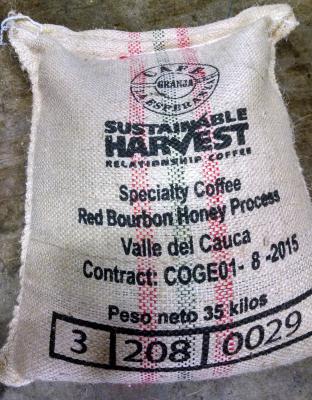
TIP: You can save products to
your favorites list if you log in
It's not every day we get to meet our growers/partners in the coffee trade, so it was especially satisfying to hear a presentation by the directorial team of Colombia Café Granja La Esperanza. They were in Portland after the huge SCAA event in Seattle to receive barista training and conduct a cupping of some of their prized, micro-production coffees. Don Rigoberto Herrera (El Mago”…the Magician), a humble man with a longstanding family stake in this enterprise, has been “breaking the mold” for Colombian production, emphasizing process and quality control where few have tread before. Colombia produces astonishing quantities of coffee…third highest in the world after powerhouse Brazil and robusta-only Vietnam…and most of it, remarkably, is good-to-excellent. But the cream rises to the top, and Granja La Esperanza is leading the charge in Colombia, following the path of industry “renegades” elsewhere such as Aida Batlle and Finca El Manzano in El Salvador and Panamanian noteworthies Hacienda La Esmeralda and Finca La Mula. This is an intensely focused group of growers who are exploiting the great potential of their terroir and producing the highest-quality coffees in the non-East Africa world. They can hold their own on the cupping tables with arguably the world's finest offerings, from Ethiopia and Kenya
Granja's cutting-edge involves the selection of cultivars to grown on specific sites on their three farms, which have unique microclimates. Their trial-and-error period was painstaking and occasionally costly, such as when they planted 10,000 trees of a varietal which failed miserably and had to be replanted with another strain. Botany is everything to a grower…there are wild-card factors which make certain coffees ( especially in the vaunted and unpredictable Gesha family, on which they have been focusing intensively and selectively) produce up to 4 different possible strains, discernible only after the shrub is maturing. Certain cultivars, especially in the Borbon family, are extremely susceptible to natural diseases and must be meticulously watched. Such is the care at Granja that cherry pickers receive special, varietal-specific training and responsibility, a level of attention which can triple the cost of plant management and cultivation. The added-value natural and honey-processing of most varietals, tied in with extremely limited net cherry production, creates further layers of complication and cost factors. These are among the most micro-managed coffees in the world, yet the prize is great and we are avidly supporting their efforts to produce these rare gems.
The Red Borbon Honey Process, coming from a less than 2 hectare section in the Las Margaritas farm in Caicedonia, is one of the microlots we're offering in limited quantity. It is a delicate strain evincing deep floral and fruity notes. The density of this varietal ,combined with the honey processing (the cherries are partially depulped and dried slowly on raised beds) and lower-than-average humidity levels of the processed coffee make for a bold cup. We are roasting this coffee light for full effect both aromatically and structurally.




